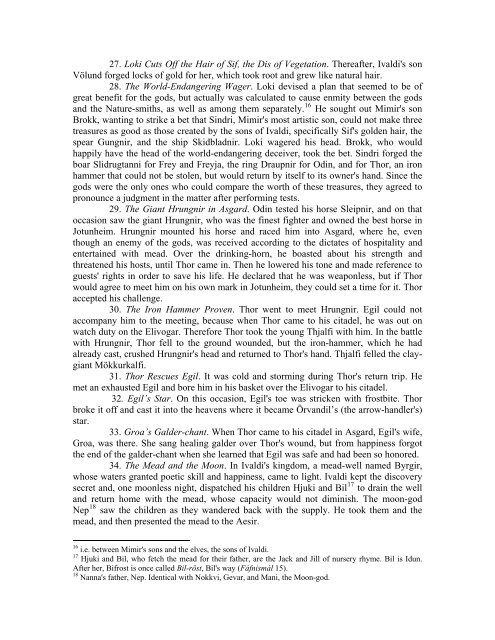Viktor Rydberg's Investigations into Germanic Mythology, Vol. II
Viktor Rydberg's Investigations into Germanic Mythology, Vol. II
Viktor Rydberg's Investigations into Germanic Mythology, Vol. II
Create successful ePaper yourself
Turn your PDF publications into a flip-book with our unique Google optimized e-Paper software.
27. Loki Cuts Off the Hair of Sif, the Dis of Vegetation. Thereafter, Ivaldi's son<br />
Völund forged locks of gold for her, which took root and grew like natural hair.<br />
28. The World-Endangering Wager. Loki devised a plan that seemed to be of<br />
great benefit for the gods, but actually was calculated to cause enmity between the gods<br />
and the Nature-smiths, as well as among them separately. 16 He sought out Mimir's son<br />
Brokk, wanting to strike a bet that Sindri, Mimir's most artistic son, could not make three<br />
treasures as good as those created by the sons of Ivaldi, specifically Sif's golden hair, the<br />
spear Gungnir, and the ship Skidbladnir. Loki wagered his head. Brokk, who would<br />
happily have the head of the world-endangering deceiver, took the bet. Sindri forged the<br />
boar Slidrugtanni for Frey and Freyja, the ring Draupnir for Odin, and for Thor, an iron<br />
hammer that could not be stolen, but would return by itself to its owner's hand. Since the<br />
gods were the only ones who could compare the worth of these treasures, they agreed to<br />
pronounce a judgment in the matter after performing tests.<br />
29. The Giant Hrungnir in Asgard. Odin tested his horse Sleipnir, and on that<br />
occasion saw the giant Hrungnir, who was the finest fighter and owned the best horse in<br />
Jotunheim. Hrungnir mounted his horse and raced him <strong>into</strong> Asgard, where he, even<br />
though an enemy of the gods, was received according to the dictates of hospitality and<br />
entertained with mead. Over the drinking-horn, he boasted about his strength and<br />
threatened his hosts, until Thor came in. Then he lowered his tone and made reference to<br />
guests' rights in order to save his life. He declared that he was weaponless, but if Thor<br />
would agree to meet him on his own mark in Jotunheim, they could set a time for it. Thor<br />
accepted his challenge.<br />
30. The Iron Hammer Proven. Thor went to meet Hrungnir. Egil could not<br />
accompany him to the meeting, because when Thor came to his citadel, he was out on<br />
watch duty on the Elivogar. Therefore Thor took the young Thjalfi with him. In the battle<br />
with Hrungnir, Thor fell to the ground wounded, but the iron-hammer, which he had<br />
already cast, crushed Hrungnir's head and returned to Thor's hand. Thjalfi felled the claygiant<br />
Mökkurkalfi.<br />
31. Thor Rescues Egil. It was cold and storming during Thor's return trip. He<br />
met an exhausted Egil and bore him in his basket over the Elivogar to his citadel.<br />
32. Egil’s Star. On this occasion, Egil's toe was stricken with frostbite. Thor<br />
broke it off and cast it <strong>into</strong> the heavens where it became Örvandil’s (the arrow-handler's)<br />
star.<br />
33. Groa’s Galder-chant. When Thor came to his citadel in Asgard, Egil's wife,<br />
Groa, was there. She sang healing galder over Thor's wound, but from happiness forgot<br />
the end of the galder-chant when she learned that Egil was safe and had been so honored.<br />
34. The Mead and the Moon. In Ivaldi's kingdom, a mead-well named Byrgir,<br />
whose waters granted poetic skill and happiness, came to light. Ivaldi kept the discovery<br />
secret and, one moonless night, dispatched his children Hjuki and Bil 17 to drain the well<br />
and return home with the mead, whose capacity would not diminish. The moon-god<br />
Nep 18 saw the children as they wandered back with the supply. He took them and the<br />
mead, and then presented the mead to the Aesir.<br />
16 i.e. between Mimir's sons and the elves, the sons of Ivaldi.<br />
17 Hjuki and Bil, who fetch the mead for their father, are the Jack and Jill of nursery rhyme. Bil is Idun.<br />
After her, Bifrost is once called Bil-röst, Bil's way (Fáfnismál 15).<br />
18 Nanna's father, Nep. Identical with Nokkvi, Gevar, and Mani, the Moon-god.
















